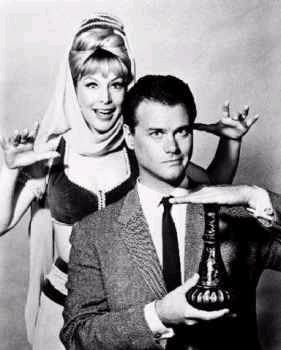
What major world religion today believes in the existence of genies?
I don't intend to demean; I was just so started to discover that the worldview of Isalm includes the existence of genies, or "Jinns." But now that I think about it, it does make sense. Islam was formed when Mohammed commandeered Arabian folk religion by imposing monotheism over it. Jinns survived the conquest, and are to be found in the Qu'ran.
From the article at Wikipedia:
For the ancient Semites, jinn were spirits of vanished ancient peoples who acted during the night and disappeared with the first light of dawn; they could make themselves invisible or change shape into animals at will; these spirits were commonly believed to be responsible for diseases and for the manias of some lunatics. Types of jinn include the ghul (night shade, which can change shape), the sila (which cannot change shape) and the ifrit.
The Arabs believed that the jinn were spirits of fire, although sometimes they associated them with succubi, demons in the forms of beautiful women, who visited men by night to copulate with them until they were exhausted, drawing energy from this encounter just as a vampire is supposedly sustained by his victim's blood.
Muslims believe that jinn are real beings. The jinn are said to be creatures with free will, made of smokeless fire by God (the literal translation being "subtle fire", i.e. a fire which does not give itself away through smoke), much in the same way humans were made of a metaphorical clay. In the Qur'an, jinn are frequently mentioned and Sura 72 of the Qur'an named Al-Jinn is entirely about them. In fact, the prophet Muhammad was said to have been sent as a prophet to both "humanity and the jinn." The jinn have communities much like human societies: they eat, marry, die, etc. They are invisible to humans, but they can see humans. Sometimes they accidentally or deliberately come into view or into contact with humans.
Jinn are beings much like humans, possessing the ability to be good and bad. They have the power to transform into other animals and humans, and they are known to prefer the form of a snake. It is also known that they eat bones and their animals eat droppings, that is why it is forbidden to perform Istinja (washing) with those items. Jinns also have the power to possess humans, have much greater strength than them, and live much longer lives. In fact, according to some hadith, the great-grandson of Iblis, or the Devil (who was born before mankind), converted to Islam during the time of Muhammad, so he must have been thousands of years old. According to the majority of Islamic scholars, clear evidence exists in the Qur'an that the Devil was not an angel (as thought by Christians), but a jinn, citing the Quranic verse "And when We said to the angels:'Prostrate yourselves unto Adam.' So they prostrated themselves except Iblis (The Devil). He was one of the jinn..." Surat Al-Kahf, 18:50. According to Islam, angels are different physical beings, and unlike the fiery nature of jinn, they are beings of goodness and cannot choose to disobey God, nor do they possess the ability to do evil. Evil Ifrit (pronounced AYE-FRIT) in the 1000 Nights and a Night are called "the seed of Iblis".
In Islam-associated mythology, the jinn were said to be controllable by magically binding them to objects, as Suleiman (Solomon) most famously did; the Spirit of the Lamp in the story of Aladdin was such a jinni, bound to an oil lamp. Ways of summoning jinn were told in The Thousand and One Nights: by writing the name of Allah in Hebraic characters on a knife (whether the Hebrew name for God, Yaweh, or the Islamic Allah is used is not specified.), and drawing a diagram (possibly a pentagram) and strange symbols and incantations around it.
It is said that one could kill a jinn with the Inwa, a manner of throwing the stone of a fruit so hard so it could, in fact, kill something. The jinn's power of possession was also addressed in the Nights. It is said that by taking seven hairs out of the tail of a cat that was all black except for a white spot on the end of its tail and then taking the possessed and burning the hairs in a small closed room with them, filling their noses with the scent. This would release them from the spell of the jinn inside them.
In the Qur'an, Suleiman had members of his army belonging to the race of jinn. Suleiman had the ability to communicate with all creatures, which allowed him to communicate with the jinn as well. Evil beings from among the jinn are roughly equivalent to the demons of Christian lore. In mythology, jinn have the ability to possess human beings, both in the sense that they persuade humans to perform actions, and like the Christian perception of demonic possession.



2 comments:
Well, to be fair, mediæval Christians and Irish ones today (in Ireland), I understand, seriously believe in fairies (literally - not the slang for gays), a kind of spirit and not very nice either.
Interesting point. There are also Christians today who believe in ETs, the hollow earth, and the Abonibable Snowman. However, the big difference is that this things are not articles of faith, and they are not primitive superstitions that became enshrined in the holy book of a major world religion.
Post a Comment